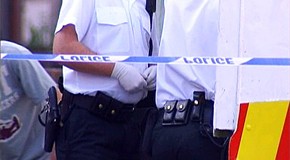I responsabili della polizia nordirlandese hanno negato che la PSNI sia a corto di personale, mentre lanciano una campagna per assumere agenti esperti provenienti dal Regno Unito e dalla Repubblica

La mossa ha sollevato la preoccupazione che la forza di polizia in Irlanda del Nord sia in sotto numero, notizia che il direttore della Risorse Umane della PSNI, Joe Stewart, respinge.
“Non è questione di essere sotto numero; ci si è presentata l’opportunità e l’abbiamo colta”, ha affermato.
“Abbiamo ottenuto il finanziamento supplementare per combattere la minaccia repubblicana e con questo siamo in grado di spostare i poliziotti già esistenti per quello scopo, reclutando nuovo personale per affrontare i problemi della criminalità comune”.
Stewart ha detto che sebbene la PSNI sia particolarmente desiderosa di trovare detective, investigatori finanziari e coloro che sono addestrati in crimini sessuali gravi, ci sono anche altre posizioni vacanti.
“Non c’è un comandante di polizia nel Regno Unito o nella Repubblica che non vorrebbe più agenti se avesse i soldi per assumerli. Quello che possiamo fare è reclutare agenti con esperienza, possiamo anche assicurarci di avere agenti di polizia in lavori che richiedono competenze di polizia, e ciò significa anche l’assunzione di circa 100 agenti”.
Il presidente della Police Federation Terry Spence ha accolto favorevolmente l’iniziativa, ma ha detto che il reclutamento di 40 poliziotti non è sufficiente.
“E’ una goccia nel mare – continuiamo a dire di aver bisogno di ulteriori 1000 agenti in modo da poter affrontare questa minaccia terroristica, far fronte a questa situazione dell’ordine pubblico e gestire la polizia comunitaria, come era previsto nelle raccomandazioni Patten”, ha detto.
Spence dice che il denaro potrebbe essere utilizzato in altri modi per aiutare gli agenti di polizia già arruolati.
“E’ molto chiaro che ci sono enormi quantità di denaro che vengono spesi per impegni di lavoro straordinario e ho una ferma convinzione che se alcuni di quei soldi fossero dirottati verso gli ufficiali supplementari all’interno del servizio ci sarebbe meno lavoro straordinario ed i poliziotti non sarebbero affaticatio spremuti”, ha concluso.
Una campagna di assunzione analoga avvenne quattro anni fa, quando vennero assunti i detective del Dipartimento Operazioni Criminali provenienti da altri servizi di polizia.
Una campagna pubblicitaria inizierà ai primi di luglio, con annunci di reclutamento nel Regno Unito e nella Repubblica d’Irlanda. Il processo sarà completato all’inizio dell’autunno.
Tratto da Utv
PSNI not understaffed despite job push
Police chiefs in Northern Ireland have denied the PSNI is under-resourced, as they launch a campaign to recruit experienced officers from forces in the UK and Republic.
The move has sparked concerns that the police force in Northern Ireland is under-staffed, something PSNI Senior Director of Human Resources, Joe Stewart, refutes.
“It’s not a question of being under-resourced; it’s the opportunity presenting itself to us and us seizing the moment to take this initiative,” he said.
“We got the additional funding to help combat the dissident threat and with this we can move existing officers to that focus and recruit these new people in to deal with standard crime issues.”
Mr Stewart said although the PSNI is especially keen to find detectives, financial investigators and those who are trained in serious sex crime, there are other positions.
“There’s not a chief constable across the UK or Republic who wouldn’t take more officers if they had the money for them. What we can do is recruit experienced officers, we can also ensure we have police officers in jobs that require police powers, and that means also recruiting about 100 police staff.”
Chair of the Police Federation Terry Spence has welcomed the move, but said recruiting 40 officers is not enough.
“It’s a drop in the ocean – we’re on record as saying we need an additional 1,000 officers so that we can meet this terrorist threat head on, deal with this public order situation and deal with community policing as was envisaged in the Patten recommendations,” he said.
Mr Spence says money could be used in other ways to assist existing police officers.
“It’s very clear that there are huge amounts of money being spent on overtime commitments and I have a firm view that if some of that money was redirected to additional officers within the service there would be less overtime having to be worked and officers would not be fatigued or experiencing burnout,” he said.
A similar recruitment drive took place four years ago, when a number of detective constables were appointed to the PSNI’s Crime Operations Dept from other police services.
An advertising campaign will begin in early July, with recruitment ads being placed in UK and Irish police publications with the process completing in early autumn.